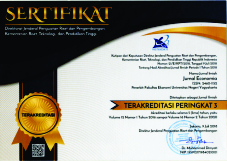Self-Efficacy and Intensity of the Use of Social Media on Consumption Behavior: Case Study in the Economics Faculty of Yogyakarta State University
Downloads
Abstract: This study aims to examine the effect of self-efficacy and the intensity of social media use on student consumption behaviour, both partially and simultaneously. It belongs to causal associative research with a quantitative approach. The population of this study was 476 undergraduate students batch of 2016 in the Faculty of Economics, Yogyakarta State University (YSU). A sample of 217 students was selected through a proportional cluster random sampling technique. Data were collected using questionnaires that were previously tested for validity and reliability. The data analysis technique used a multiple regression.
Keywords: consumption behavior, self-efficay, intensity of the use of social media
Efikasi Diri dan Intensitas Penggunaan Media Sosial Terhadap Perilaku Konsumsi: Stadi Kasus di Fakultas Ekonomi Universitas Negeri Yogyakarta
Abstrak: Penelitian ini bertujuan untuk mengetahui pengaruh efikasi diri dan intensitas penggunaan media sosial terhadap perilaku konsumsi mahasiswa, baik secara parsial maupun simultan. Penelitian ini termasuk penelitian asosiatif kausal dengan pendekatan kuantitatif. Populasi penelitian ini adalah 476 mahasiswa Strata-1 Fakultas Ekonomi Universitas Negeri Yogyakarta angkatan 2016. Adapun jumlah sampel 217 mahasiswa yang diambil dengan teknik proportional cluster random sampling. Data dikumpulkan dengan kuisioner yang telah diuji validitas dan reliabilitasnya. Teknik analisis data yang digunakan adalah regresi berganda.
Kata kunci: perilaku konsumsi, efikasi diri, intensitas penggunaan media sosial
Downloads
Ajzen, I. (1985). From Intentions to Actions: A Theory of Planned Behavior. In J. Kuhl, & J. Beckman, Action Control: From Cognition to Behavior. Germany: Springer.
Ajzen, I. (2005). Attitude, Personality and Behavior. Berkshire, UK: Open University Press-McGraw Hill Education.
Azwar, S. (1998). Sikap Manusia: Teori dan Pengukuran. Yogyakarta: Pustaka Pelajar.
Bandura, A. (1986). Social Foundation of Thought and Action: A social Cognitive Theory. New Jersey: Prentice-Hall.
Bandura, A. (1995). Self-Efficacy in Changing Societies. New York: Cambridge University Press.
Bandura, A. (1997). Self-Efficacy: The Exercise of Control. New York: W.H Freeman and Company.
Bandura, A. (2001). Social Cognitive Theory: An Agentic Perspective. Annual Review of Psychology, Vol 52, No. 1, 1-26.
Bandura, A., & Locke, E. A. (2003). Negative Self-Efficacy and Goal Effects Revisited. Journal of Applied Psycology, Vol 88, No. 1, 87-99.
Baron, R. A., & Byrne, D. (2008). Psikologi Sosial (Terjemahan Ratna Djuwita, et.al. Jakarta: Erlangga.
Budac, C., & Baltador, L. (2013). The Value of Brand Equity. Procedia Economics and Finance, Vol 6, 444-448.
Flammer, A. (1995). Developmental Analysis of Control Beliefs. In A. Bandura, In Self-efficacy in Changing Societies (pp. 69-113). New York: Cambridge University Press.
Garlin, F., & Denholm, R. M. (2002). Exploring the Sources of Self-Efficacy in Consumer Behavior. Asia Pacific Advances in Consumer Research, Vol 5.
Gibson, J. L., Donnelly Jr, J. S., Ivancevich, J. M., & Konopaske, R. (2003). Organizations: Behavior, Structure and Processes. New York: McGraw-Hill.
Gunelius, S. (2011). 30-Minute Social Media Marketing. United States: McGraw-Hill Companies.
Lee, E. (2013). Impacts of Social Media on Consumer Behavior. Turku University of Applied Sciences International Business, Bachelor of Business Administration.
Loroz, P. S., & Helgeson, J. G. (2013). Boomers and their Babies: An Exploratory Study Comparing Psychological Profiles and Advertising Appeal Effectiveness Across Two Generations. Journal of Marketing Theory and Practice, Vol 21 (3), 289-306.
McCann, M., & Barlow, A. (2015). Use and measurement of social media for SMEs. Journal of Small Business and Enterprise Development, 273-287.
Mittal, B. (2006). I, Me, And Mine"”How Products Become Consumers' Extended Selves. Journal of Consumer Behaviour, Vol 5 (6).
Nobel, The Committee for the Prize in Economic Sciences in Memory of Alfred. (2017). Richard H. Thaler: Integrating Economics with Psychology. The Royal Swedish Academy of Sciences.
Nugroho. (2015). Perilaku Konsumen. Jakarta: Prenadamedia Group.
Ramnarain, Y., & Govender, K. K. (2013). Social Media Browsing and Consumer Behaviour: Exploring the Youth Market. African Journal of Business Management, Vol. 7 (18), 1885-1893.
Rohmawati, E. (2014). Analisis Pengaruh Iklim Etika Organisasi dan Efikasi Diri terhadap Keinginan berpindah kerja dengan Kepuasan Kerja sebagai Variabel Pemediasi. Yogyakarta: Universitas Gadjah Mada.
Rotter, J. B. (1975). Some problems and misconceptions related to the construct of internal versus external control of reinforcement. Journal of Consulting and Clinical Psychology, Vol 43, 56-67.
Rotter, J. B. (1990). Internal vs. external control of reinforcement: A case history of a Variable. American Psychologist, Vol 45 (4), 489-493.
Safko, J. L. (2010). The Social Media Bible: Tactics, Tools, and Strategies for Business Success . Chicago: John Wiley and Sons Inc.
Santrock, J. W. (2008). Psikologi Pendidikan (Terjemahan Tri Wibowo B.S). Jakarta: Kencana.
Schneewind, K. A. (1995). Impact of Family Processes on Control Beliefs. . In A. Bandura, In Self-efficacy in Changing Societies (pp. 114-148). New York: Cambridge University.
Suryani. (2008). Perilaku Konsumen: Implikasi pada Strategi Pemasaran. Yogtakarta: Graha Ilmu.
Thoumrungroje, A. (2014). The Influence of Social Media Intensity and EWOM on Conspicuous Consumption. Social and Behavioral Sciences, Vol. 148, 7-15.















